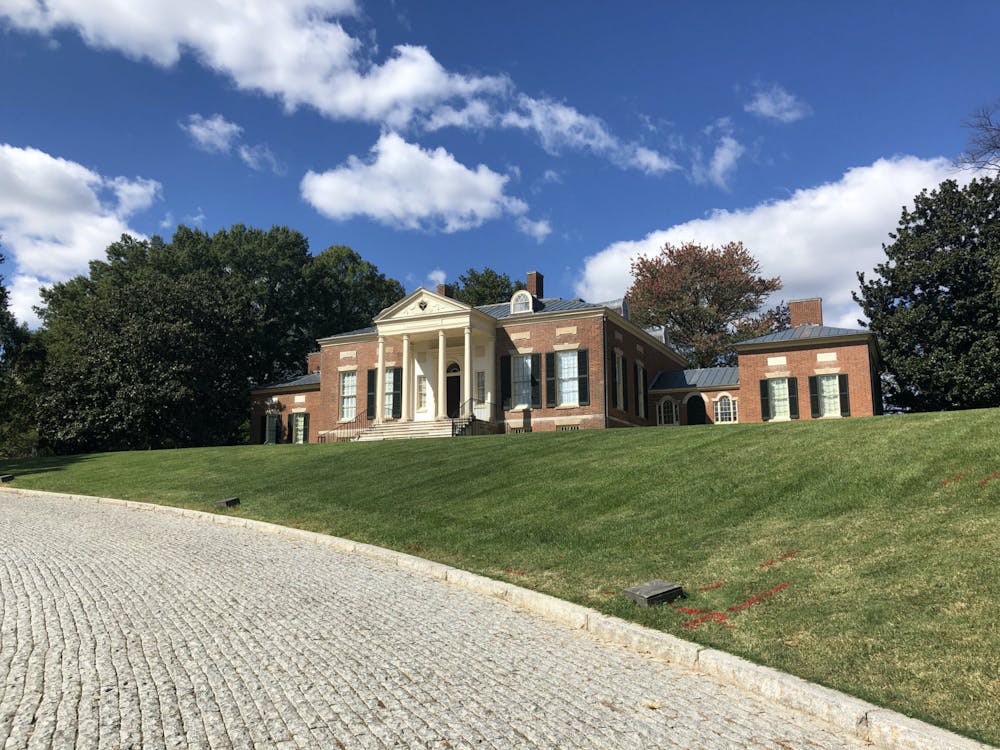University leaders held a virtual town hall on Dec. 11 to discuss the recent discovery that University founder and namesake Johns Hopkins owned enslaved Black people. The event was moderated by Chief Diversity Officer Katrina Caldwell.
Prior to new evidence released last Wednesday, it was believed that Hopkins was a lifelong abolitionist. However, public records now reveal that he owned at least four enslaved people in the 1850s and one in the 1840s.
At the town hall, University President Ronald J. Daniels expressed his disappointment about the discovery.
“We have, for almost a hundred years, communicated a story about our origins which was not correct,” he said. “How did we embrace so readily, with such gusto, this narrative that... was not born at the time that the institution was created?”
Senior Peggy-ita Obeng-Nyarkoh, who attended the town hall, was frustrated by the event.
“It was a really classic example of the ways that Hopkins likes to not take accountability for any actions pertaining to the institution,” she said. “It was a lot of talking around things and not actually giving concrete answers.”
Martha Jones, who has been leading the research on Hopkins’ slaveholding, explained that her team has been relying on 1850s census records and other documents at the Maryland State Archives to uncover the truth about Hopkins’ life since few private records still exist. Jones is the Society of Black Alumni Presidential Professor and a professor of history.
“Our process is one of assembling shards,“ she said. “It doesn’t tell the whole story... We don’t know enough about the relationships within that household... We don’t know their fates after 1850. One of the cruel dimensions of these documents is that they don’t name the enslaved persons themselves, and so our work is ongoing to learn who they were.”
According to Jones, there is much work left to do. Although she explained that researchers still have plenty of sources to look through, she encouraged those in the community with information to step forward.
Jones hopes that this research will eventually give Baltimore a full picture of both Hopkins and the individual people enslaved under him.
This research, Daniels said, will also help the University moving forward.
“Learning this history is not a sterile intellectual enterprise. What we’re really anxious to do is to see how that history has echoes and reverberations to our present time,“ he said. “I actually feel quite excited about what is possible from this moment and from the information we’re addressing... From those learnings comes the possibility of real progress.”
When asked how the University planned to recognize and memorialize those enslaved by Hopkins, Daniels suggested hosting an event after more information is collected.
“We want to know more before we go to that event because as we learn more about these individuals and maybe even can put names to them and names to their descendants, it will become that much more meaningful,” he said.
Jones disagreed with Daniels.
“We already know enough about them to acknowledge them, to honor them, even if we never learn another thing about them,” she said.
Sophomore Jayla Scott, who attended the town hall, told The News-Letter that she believes it is not the University’s place to decide how to memorialize those enslaved.
“Once information is found about the descendants of these slaves who are probably still in Baltimore, you need to be asking those families what they want,” she said. “Hopkins has a big problem doing things to rectify their past mistakes without actually asking the people they’ve harmed.”
Scott also expressed her disappointment with the news as a whole.
“It’s frustrating that they’re just now releasing this news and that this wasn’t discovered before,” she said. “Why would you spread this legacy about your founder without looking at documents to confirm that this was true?”
In addition, Scott expressed her frustration with the town hall, which she found unproductive. She noted that many of her peers’ questions remained unanswered since most of the questions were pre-screened.
Obeng-Nyarkoh criticized how students and community members were unable to directly participate in the conversation, which she felt was more of a panel than a town hall.
According to Obeng-Nyarkoh, the news that Hopkins owned slaves is not a surprise.
“Given the time period and given the fact that Johns Hopkins, the man, was wealthy enough to found and be the benefactor for an institution and a hospital, it’s kind of indicative that, given the time period, he got his money through slavery,” she said. “Black students on this campus have been saying this for a while.”
Obeng-Nyarkoh also argued that it is time for the University to get serious about combating anti-Black racism.
“This is the same year that a noose was found in a Hopkins-associated building, and nothing was done about that,” she said. “Hopkins needs to take a deep and serious look at this institution.”
In a video shown at the beginning of the town hall, Jones explained that coming to terms with this newly revealed history may be hard for University affiliates. She also warned that there might not be easy answers.
“We really are obliged to dig further and to rethink the very foundational narrative that sits underneath our University today,“ she said. “We have to acknowledge that both things can be true. One can have been a slaveholder and then imagine oneself the benefactor. One does not negate the other. In the United States, both things can be true.”





